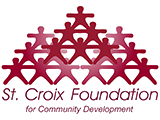Historically, whenever those responsible for our local education system (i.e. the Board of Education, Department of Education and teachers’ union) convene before the Senate, there has been a contentious and argumentative game of blame. In fact, in most struggling school districts one can often find a multitude of finger-pointing about the issues and challenges facing that educational system. While many believe that power-struggles and a lack of accountability are at the heart of these historic disagreements, St. Croix Foundation believes that another underlying factor to these conflicts is actually trust— or the lack thereof.
As one of the most active nonprofit education stakeholders in the Territory, the Foundation has grown keenly aware of the enormous role which trust plays in building and sustaining meaningful private-public partnerships. So much so that, despite our shared goals, fidelity, and $1,000,000-plus investment of scarce resources into our public education system, we have at times been exposed to some of the same rancor and discord displayed in past Senate hearings.
What has become abundantly clear to us is that both education leaders and community stakeholders must find middle ground in order to develop the necessary partnerships that produce meaningful outcomes for our students and our public schools. But for that to happen, all stakeholders must first come to recognize that so long as the success of our children is central to everyone’s agenda, then we are all on the same side.
What we can all agree on is that we are not alone. There are districts around the nation and countries around the world that are contending with the very same challenge of building consensus and employing collaboration– of creating Trust. One country’s story of systemic education transformation that we keep referring back to is Finland, partly because it was long, it was arduous, and it worked! Not only did the process take many years, but it began with one central focus: TRUST.
To begin the process of system-wide educational transformation, Finland first developed a consensus on the importance and purpose of education. They clearly defined why the process of reform was even necessary. They determined, collectively, that learning had to be “sacrosanct” — revered by everyone in the country. Finns very shrewdly decided that at the core of their system would be exemplary teacher training, because they believed that if they could trust teachers in the classroom, first and foremost, they could create a system that didn’t require ‘inspectorates’ or evaluations throughout the system. Then, they professionalized their teacher training programs, educating their teachers like doctors. As a result, embedded in Finland’s system is a high degree of trust that teachers are doing their jobs and doing it at the highest standard. They firmly believe that a compliance-based system whereby people were checking up on teachers would result in a lack of focus on teaching.
In the end, it took 25 long years for education stakeholders in Finland to learn how to trust one another. But today, they have an international model of educational reform based primarily on trust, collaboration, and professionalism wherein the Ministry trusts municipalities and municipalities trust schools. Then, by virtue of the rigor of their teacher training, there is more rigor in the classroom and as a result schools implicitly trust teachers; and parents trust the whole system. While the system in not perfect and there are still areas in need of reform, Finland is one model of how to approach system-wide reform.
The Foundation believes there are some very specific ways that the Territory can start the process of fostering more trusting, high-impact partnerships among all stakeholders particularly between private and public sectors in support of high-quality education, including the following:
- Nurture and sustain high levels of accountability, transparency and open lines of communication between all stakeholders
- Educate the community on the system itself: how and why it works
- Diversify brokers and invite the private sector to the table when important decisions need to be made, so that school and District leaders can marry strengths and overcome weaknesses—in turn, netting greater results for all.
It is universally understood that for schools to be successful, the entire community must support them. So this Election Season, let’s ask our candidates what policies they are willing to support that will engender collaboration and trust in our educational system. We believe two points of agreement we can begin with are that the interest of our children must always come first and that our teachers should be the most highly trained professionals in the region.
This election year let’s make education our priority.
Sources & Suggested Readings
In teachers they trust: https://www.todayonline.com/commentary/teachers-they-trust
The school district’s big trust problem: https://parentsunitedphila.com/2014/03/24/the-school-districts-big-trust-problem/
